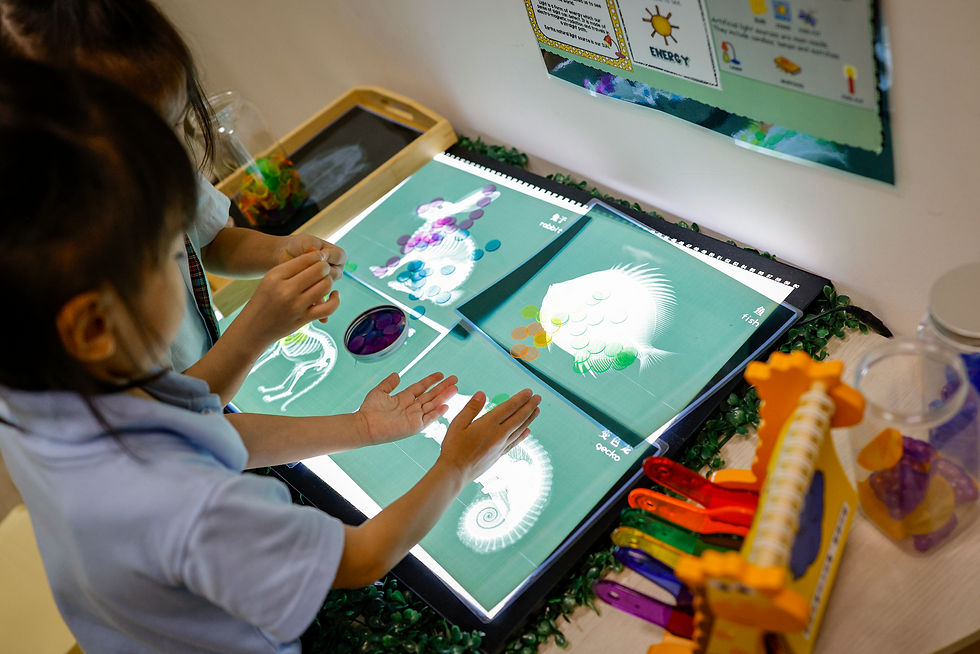Professor Adele Diamond's Affirmation
- Aug 6, 2025
- 4 min read
Updated: Nov 19, 2025

On 4 August, we were honoured to host world-renowned developmental neuroscientist, Professor Adele Diamond at in one of partnering preschools of our Little Olive Tree (LOT) – The Chinese Kindergarten Preschool.
Professor Diamond, best known for her pioneering research on executive function (EF) in early childhood, walked through our classrooms, observed the children at play and learning, and reflected on what she saw. Her visit affirmed the intentional efforts we take to build a preschool culture rooted in our core values and grounded in research-informed practice.
Her observations highlight the strengths of our approach and how our learning environment effectively supports the development of EF skills—such working memory, inhibitory control & cognitive flexibility —which are essential for future success in school and life.
During her walkabout, we were encouraged and heartened to see that the practices we hold dear at Little Olive Tree and The Chinese Kindergarten resonated with her observations. These practices also echoed what Professor Adele Diamond has championed in her life’s work:
1. Psychological Safety Enables Deep, Authentic Learning
During her visit, Professor Diamond observed a K2 class of about 20 children engaged in a Math lesson on sorting and comparing quantities. What stood out to her wasn’t just the content being taught—but how it was taught.
Observation:
She noted how the teacher adopted a democratic approach, allowing the child who had answered to choose who would answer next. When one child expressed that he wasn’t ready to go forward and attempt the question, the teacher responded calmly and respectfully, assuring him that he could participate when he felt ready. This seemingly small gesture deeply impressed Professor Diamond—it was a powerful example of how psychological safety is actively cultivated in the classroom.
Reflection:
When children feel emotionally secure, they are more likely to take initiative, speak their minds, and explore without fear of failure. This emotional grounding directly supports executive functions like impulse control and focus. In our preschools, we intentionally nurture this safe environment—not just through physical setup, but through how teachers respond, guide, and affirm each child..


2. Autonomy and Exploration Fuel Engagement and Ownership
In another part of the preschool, Professor Diamond noticed how children were given intentional pockets of time for self-exploration with minimal adult intervention. Rather than being directed step-by-step, the children were free to engage with various materials—some were building with blocks, while others were exploring textures through shading activities in a learning area.
Observation:
What struck her most was not just the independence, but the trust placed in the children. The materials available were not fancy—foam noodles, rubber bands, recyclables—yet they opened the door to rich, imaginative play. She highlighted how these open-ended moments help children to construct their own knowledge, practice cognitive flexibility, and make choices with confidence.
Reflection:
In our preschools, we believe that children should be active participants in their learning—not passive receivers. That means building in space for autonomy, where teachers step back to observe and scaffold only when needed. This supports critical EF development—like planning, decision-making, and mental flexibility.
When a child rubs two objects together or builds a tower “their own way,” they are practicing trial-and-error thinking, managing impulses, and learning from natural consequences. These are not just play moments—they are executive function workouts.

3. Culture, Language, and Relationships Deepen Holistic Development
In one of our Nursery classrooms, Professor Diamond witnessed a moment that beautifully captured the heart of our learning culture. As the children sat together on the floor drinking water, a little girl looked up at Professor Diamond and spontaneously initiated a conversation—in Chinese. When the child realised that Adele didn’t understand her fully, she tried to communicate using a few English words. Slowly, more children joined in, and the room was filled with joyful chatter, laughter, and confidence.
Observation:
What stood out was not just their linguistic ability, but the ease and confidence with which they engaged a new adult. Despite it being their first time meeting her, the children were not anxious or clingy—even with a group of unfamiliar visitors entering the room. They were secure, expressive, and happy—rooted in a culture where relationships, language, and identity are nurtured together.

Reflection:
At Little Olive Tree & The Chinese Kindergarten, we believe that children’s development is not just academic—it is relational, cultural, and deeply social. Our dual-language environment (particularly the rich use of Chinese in natural settings) strengthens not just language skills, but also executive function capacities such as cognitive flexibility, working memory, and perspective-taking. Our school culture—where children feel seen, heard, and valued—lays the essential groundwork for both social and cognitive development.
Executive functions grow best in environments where clear structures are anchored in warmth, and where children are not just guided but inspired by those around them. Our principals and teachers embody this each day through their presence and practice.
A Culture that Grows The Whole Child
Professor Adele Diamond’s visit was a powerful validation of what lies at the heart of Little Olive Tree’s & The Chinese Kindergarten’s philosophy:
That building a strong foundation (Truth, Beauty, Goodness) in the whole child—mind, heart, and spirit—requires more than curriculum. It calls for a community of trusted adults, a culture of shared values, and a consistent belief that every child has the potential to grow in their own time and way.
We’re not just preparing children to read or count. We’re helping them develop the skills to focus, persevere, care deeply, and navigate life with purpose. This is the culture we build in our preschools—one rooted in Truth, blossoming in Beauty, and shining with Goodness deeply aligned with how children truly learn best.







